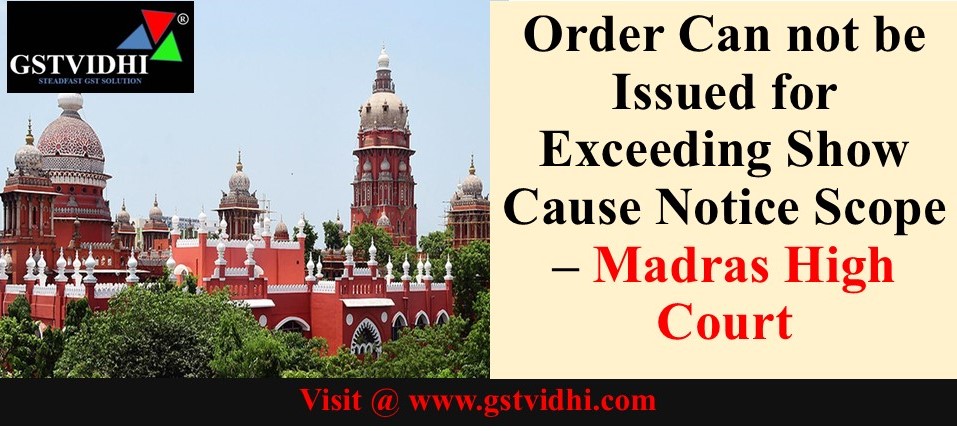
Micromini vs. Assistant Commissioner (ST) (FAC) – W.P.No.8895 of
2025
Case Name:
Micromini vs. Assistant Commissioner (ST) (FAC)
Case Number: W.P.No.8895 of 2025
Date of Order: 19.03.2025
Court: High Court of Judicature at Madras
Presiding Judge: Hon'ble Mr. Justice Krishnan Ramasamy
Summary of the Case
The present case revolves
around a writ petition filed by Micromini, represented by its partner Mr. Abu
Thahir, against the Assistant Commissioner (ST) (FAC), Intelligence-I, Chennai.
The petitioner challenged an impugned order passed under Section 74 of the
TNGST Act, 2017/CGST Act, 2017, including the summary of the order in Form GST
DRC-07, both dated 02.12.2024. The primary contention was that the impugned
order imposed a tax liability that exceeded the scope of the original Show
Cause Notice (SCN), thus violating principles of natural justice.
Facts of the Case
1. The
petitioner, Micromini, received a Show Cause Notice (SCN) from the respondent
on 14.11.2023. The notice demanded:
o Rs.
1,48,76,818/- towards tax
o Rs.
1,54,38,382/- towards penalty
2. The
petitioner filed a detailed reply on 12.12.2023, responding to the claims
raised in the SCN.
3. However,
in the final assessment order dated 02.12.2024, the respondent demanded Rs.
1,54,38,382/- towards tax, which was not mentioned in the original SCN.
4. The
petitioner argued that the respondent had acted beyond the scope of the SCN,
depriving them of an opportunity to defend themselves.
Submissions by the
Petitioner
The petitioner’s counsel,
Mr. N.V. Balaji, submitted the following arguments:
- The impugned order imposed a tax
demand that was not proposed in the SCN, thereby violating the principles
of natural justice.
- The petitioner was denied an
opportunity to respond to the increased tax liability.
- The impugned order was passed without
application of mind and should therefore be quashed.
Submissions by the
Respondent
The respondent,
represented by Additional Government Pleader Mr. T.N.C. Kaushik, admitted the
following:
- The impugned order imposed a tax
demand beyond the scope of the SCN.
- There was a procedural lapse in
issuing the final order.
- The respondent conceded that the
order should be reconsidered by following due process.
Findings of the Court
After hearing both
parties, the Hon'ble Justice Krishnan Ramasamy observed:
- The respondent violated the
principles of natural justice by raising a tax demand beyond the scope of
the SCN.
- A taxpayer must be given a fair
opportunity to present their defense before an adverse decision is made.
- The respondent should have issued a
fresh notice if they intended to increase the tax liability beyond what
was initially proposed.
Judgment of the Court
Considering the above
findings, the Court ruled as follows:
1. The
impugned order dated 02.12.2024 was set aside, and the matter was remanded
for fresh consideration.
2. The
petitioner was directed to treat the impugned order as a notice under
Section 74 of the GST Act and submit their objections within two weeks.
3. The
respondent was instructed to:
o Provide
a 14-day clear notice for a personal hearing.
o Consider
the petitioner’s objections before passing any fresh order.
o Adhere
to principles of natural justice while re-evaluating the case.
Conclusion
The Madras High Court's
decision underscores the importance of due process in tax proceedings. By
setting aside the impugned order, the Court reinforced the principle that tax
authorities must adhere to the scope of the Show Cause Notice and provide taxpayers
with a fair opportunity to defend themselves. The ruling ensures that taxpayers
are not subjected to arbitrary demands without prior notice and proper
hearings.
Disclaimer: All the Information is based on the notification, circular and order issued by the Govt. authority and judgement delivered by the court or the authority information is strictly for educational purposes and on the basis of our best understanding of laws & not binding on anyone.
Find the Attachment (Press on Click Here )
Click here